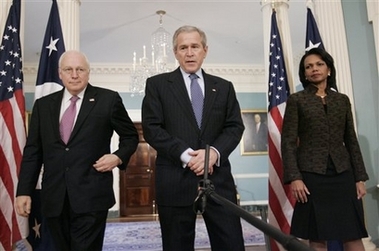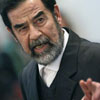Bush to meet with Iraqi vice president
Updated: 2006-12-12 20:25
WASHINGTON - While seeking a new course in Iraq, President Bush has not changed his tone about the stakes involved in the war, the importance of victory or his definition of success.
"This is really the calling of our time - that is, to defeat these extremists and radicals, and Iraq is a component part, an important part of laying the foundation for peace," the president said Monday.
Searching for any hint of change in Bush's thinking, a reporter at the White House press briefing noted that Bush usually calls Iraq the central front in the war on terror, not a component part. Did that mean anything? "Allow him to vary the phraseology from time to time," presidential spokesman Tony Snow said. "It does not mean any change in view."
Trying to show he is interested in new ideas, Bush was to hold a video conference Tuesday with senior military commanders in Iraq. He also was to meet in the Oval Office with Iraq's Sunni vice president, Tariq al-Hashemi.
Al-Hashemi said he would tell Bush of his "dismay" over the Shiite-led Iraqi government's handling of security. He accused the government of not doing enough to deal with militia attacks and said he was especially concerned about Baghdad, where Sunni-Shiite violence has flared in several neighborhoods in recent days.
"Slow and inadequate action is a problem that we have been facing with this government since it was formed," al-Hashemi said Monday in an interview with Baghdad TV, the mouthpiece of his Iraqi Islamic Party.
Continuing his outreach, Bush on Wednesday will confer with senior defense officials at the Pentagon.
On Monday, Bush went to the State Department for a 90-minute meeting to review options with advisers there, then hosted a handful of experts on Iraq policy in the Oval Office.
"Like most Americans, this administration wants to succeed in Iraq because we understand success in Iraq would help protect the United States in the long run," Bush said after his State Department briefing.
The president said his aim was to coordinate advice from his diplomatic and military advisers "so that when I do speak to the American people, they will know that I've listened to all aspects of government."
While a bipartisan commission last week described the situation in Iraq as "grave and deteriorating," Bush spoke in positive terms. He said his goal was to succeed in Iraq. "And success is a country that governs, defends itself, that is a free society, that serves as an ally in this war on terror."
Bush said Iraq was a key part of his strategy for "defeating the extremists who want to establish safe haven in the Middle East, extremists who would use their safe haven from which to attack the United States."
The administration has rejected calls for U.S. troop withdrawals until Iraq can govern and defend itself.
In an apparent reference to Syria and Iran, Bush said Iraq's neighbors have a responsibility "to help this young Iraqi democracy survive." The bipartisan commission, headed by former Secretary of State James A. Baker III and former Rep. Lee Hamilton, D-Ind., urged that the United States engage Syria and Iran but Bush has appeared cool to that idea.
|
||
|
||
|
|



